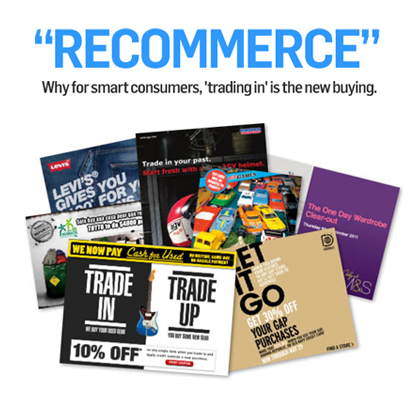Businesses capitalize on recommerce trend of selling and trading used goods
In this economy, consumers need to maximize their dollar at every turn. Increasingly, savvy shoppers are turning to recommerce – reselling or trading their old possessions – to do just that, reported Trendwatching.com. Companies and entrepreneurs are creating new choices for bargain hunters trying to make the most of their purchases. The new mantra has become “trade in to trade up,” benefitting not just consumers’ wallet but also the environment.
“It’s never been easier for consumers to unlock the value in past purchases. Novel brand buy-backs, exchange schemes, online platforms and mobile marketplaces offer smart and convenient options for consumers keen to ‘trade in to trade up,’ alleviate financial strains (double dips, anyone?) and/or quell environmental and ethical concerns,” Trendwatching.com said.
Trendwatching.com reports there are three main forces behind the new trend: nextism, statusphere and excusumption.
Nextism is when shoppers constantly lust after the new and exciting that the “next” supplies. Today’s consumer goes after the “best of the best” every time he or she whips out their credit card. Companies entice consumers to buy new goods by offering better features, increased quality and new design, which seem to promise a better life.
With statusphere, shoppers link social status with owning all the latest goods and gadgets.
“We've long said the search for social status is at the heart of all consumer trends,” Trendwatching.com declared. “But the diversification of the statusphere means that many consumers derive status from more than just ownership of the biggest, fastest or shiniest objects.”
In fact, more and more consumers are seeking to up their status by shrewd purchasing rather than flaunting their new possessions.
Although our economic troubles continue, customers still crave novel experiences. With excusumption, shoppers rationalize buying their guilty pleasures by selling or trading unwanted items.
Previous purchases often have incredible value in the resale market. So much value, in fact, that buyers are considering the resale value of the items when purchasing – and not just for their car and home, but for electronics, clothes and more.
While many are aware that their used possession can be sold for a decent bundle, oftentimes shoppers hesitate to part with their goods. Consumers fear taking a loss, and combined with overvaluing their products and the bother of selling, even rarely used items may end up sitting on consumers’ shelves.
“Trade in to trade up” programs are designed to surmount these concerns, allowing shoppers to reap the value of their unwanted items while satisfying their lust for owning the biggest, the best and the most recent.
“Shoppers in fast-moving sectors such as fashion and consumer electronics welcome trade-in programs, as they help offset the prohibitive expense of staying up-to-date with always-desirable new products with ever-shorter life spans, and often ensure that outdated items get reused or recycled,” Trendwatcher.com reported.
Companies are taking full advantage of the trend. In the hour after iPad 2 was announced, electronics trade-in website Gazelle scooped up 2,000 iPads. An Experian survey revealed 35 percent of respondents intended to purchase an iPhone 5, although they had never laid eyes on one.
Practically all electronic labels are onboard with trade-in programs. Brands such as Target, Walmart, RadioShack and Best Buy offer trading options, as well as communication companies such as Verizon, AT&T and T-Mobile.
But the phenomenon is not just confined to the electronics industry. Fashion labels and their following have also expressed interest in trade-in initiatives. French brand A.P.C. offers the Butler Worn-Out option, in which buyers can swap their old jeans for half off a new pair. Fashion retailer Mango has released Mango for Mango, which allows customers with a loyalty card to return their used items and receive 20 percent off new pieces.
Resale also presents numerous opportunities for charities to benefit. Gap shops in the U.S. and Canada offered customers a 30 percent discount on purchases for donating clothes to Goodwill. Adidas’ Refresh Your Gear initiative in the Philippines gave shoppers who brought in old shoes a price reduction on new ones.
Industries from sports apparel to toys – and more surprisingly, motorcycle helmets and music instruments – are embracing the new trend. Some retailers have even created concepts entirely around specializing in recommerce. For example, Winmark Corporation operates quite a few brands dedicated to trade-ins and second-hand goods, such as Play It Again Sports, Music Go Round, Once Upon A Child and Plato’s Closet.
But why simply consider swapping an item when you can get cash? Online options for selling goods are no longer confined to just eBay, Amazon and Craigslist. Fashion brand ASOS unveiled a Marketplace site which enables the fashion-forward to vend their discarded clothes. IKEA in Sweden offers second-hand furniture on the Web, and families can buy and sell at no cost.
The daily deal movement has also created recommerce opportunities, as more than 20 percent of vouchers are never cashed in. Consumers can sell their unused offers through a variety of start-ups. DealsGoRound, for instance, enables visitors to buy and sell unredeemed coupons from Groupon, LivingSocial, and BuyWithMe.
Recommerce has also spilled over into the mobile world. “While online platforms will forever have a place in the recommerce landscape, convenience-loving consumers will embrace the speed, spontaneity and instant gratification of mobile marketplaces,” Trendwatching.com said. “Buying and selling via mobile fits in with consumers’ active lifestyles.”
EBay has hit the jackpot with its Instant Sale mobile app, which permits users to sell unwanted goods back to the site. Since its launch in October 2010, the app has received more than 4.3 million offers. In Amazon Student, students can enter the barcodes on their books, DVDs, games and electronics to obtain the trade-in value, which is given as an Amazon gift card.
All told, there are plenty of opportunities that shoppers and businesses alike can profit from.
“By helping people realize the value in past purchases in such a way that is not only gratefully appreciated (there's a big feel-good factor to recommerce that fits well with the call for more 'human' brands), but also generates sales and profits. Which, we imagine, should be music to all business people’s ears right now,” Trendwatching.com said.
Tagged in: business, goods, resale, used, old, recommerce, possessions,




